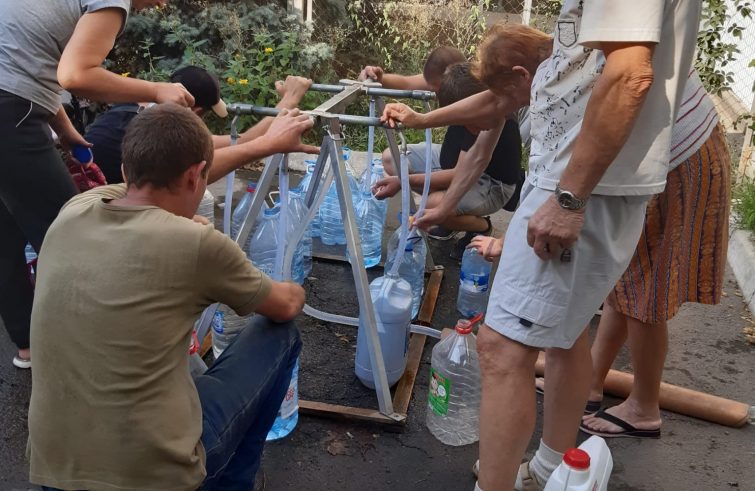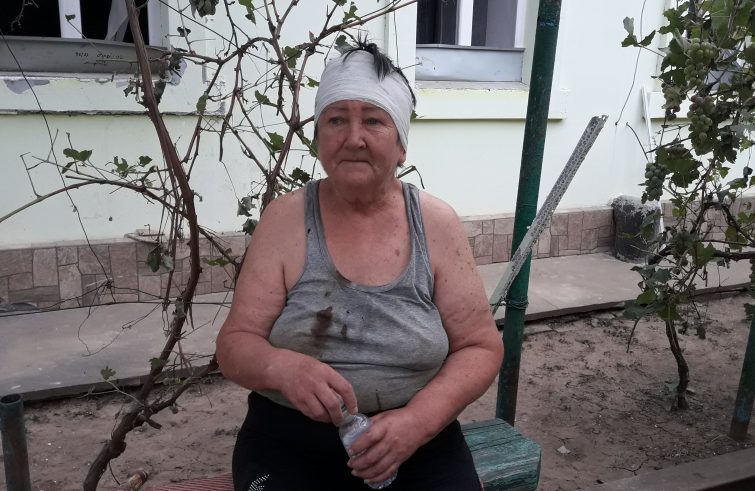
Only salt water is running out of the taps in Mykolaiv. Sometimes the water is completely brown. It cannot be used for drinking, cleaning, washing. Mykolaiv faces a severe water shortage. The first thing the Russians did was to bomb and destroy water pipelines purification network. The population was left with no access to clean, drinkable water since then. It’s war strategy: to kill people by making them die not only under bombs but also of hunger and thirst. Because of this #Stopthewarnow, a network formed by more than 175 Italian associations, movements and organisations, has decided to take action with a mission: to install at least twenty desalination units in the city providing approximately 120/130 thousand water accesses per day and thereby meet the needs of the local population. “We received the request from civil society and partner organisations,” said Gianpiero Cofano, member of the Pope John XXIII Community and coordinator of the StopTheWarNow Network, ” confirmed by Mykolaiv’s local authorities. It is therefore a documented necessity.”
No time to waste. “It is necessary to try to drill the wells before we get a metre of snow and everything freezes,” said Cofano. “Extremely cold weather prevents drilling rigs from working properly. Temperatures here drop to below zero during winter, which makes drilling operations and logistics much more problematic. It is a fight against time.” Clean water is currently being supplied to Mykolaiv by tanker trucks that arrive from Odessa and distribute water to the population at various points in the city. The StopTheWarNow Network has already managed to install two desalination units. “Our goal is to supply at least 5 litres of drinking water per person, per day, to the whole population, with micro-desalination devices installed throughout the city,” said Cofano. “We received this request also from the deputy mayor of Mykolaiv, whom we met at the end of August during the most recent peace caravan.”
The desalination plant is a long-lasting project but, above all, it allows citizens to access a source of drinking water at any time of the day, which is “crucial for a city that is under constant shelling,” stress the StopTheWarNow workers. It is therefore also a matter of security.”
 News agencies report attacks on Mykolaiv every day. The region is under siege. MiG fighter jets, missiles, drones cross the skies. StopTheWarNow has organised three peace caravans to date. The most recent one departed at the end of August and brought some fifty volunteers from Italy to Mykolaiv to join the local population in the shelters. Some members of Operation Dove remained on site to ensure continued presence, acting also as a permanent communication link with Italy. But the situation has worsened over the last 20 days, especially after Ukraine’s advance in Russian-occupied territories. The Russians are responding with unprecedented shelling. Before the war, Mykolaiv had a population of 450 thousand. There are now 200,000 people left, 80% of whom are old people. Friends and acquaintances are unfortunately also among the victims. “An elderly woman whom we knew died from a cluster bomb”, Cofano said. “A bomb exploded near the facility where we were staying. Air-raid alarms sound every hour in Mykolaiv, all the time, day and night. The Russians have seized the territories they wanted and somehow annexed them, but that doesn’t mean that the war is over. Rather, it means that they will continue bombing and slaughtering everyone in order to secure control over the conquered territory through buffer zones.”
News agencies report attacks on Mykolaiv every day. The region is under siege. MiG fighter jets, missiles, drones cross the skies. StopTheWarNow has organised three peace caravans to date. The most recent one departed at the end of August and brought some fifty volunteers from Italy to Mykolaiv to join the local population in the shelters. Some members of Operation Dove remained on site to ensure continued presence, acting also as a permanent communication link with Italy. But the situation has worsened over the last 20 days, especially after Ukraine’s advance in Russian-occupied territories. The Russians are responding with unprecedented shelling. Before the war, Mykolaiv had a population of 450 thousand. There are now 200,000 people left, 80% of whom are old people. Friends and acquaintances are unfortunately also among the victims. “An elderly woman whom we knew died from a cluster bomb”, Cofano said. “A bomb exploded near the facility where we were staying. Air-raid alarms sound every hour in Mykolaiv, all the time, day and night. The Russians have seized the territories they wanted and somehow annexed them, but that doesn’t mean that the war is over. Rather, it means that they will continue bombing and slaughtering everyone in order to secure control over the conquered territory through buffer zones.”
With regard to the desalination plants project, the involved organisations have set up a steering committee that will be coordinated by the Pope John XXIII community, which is present on site and can therefore monitor the progress of the works. The project has a total cost of EUR 500,000, including the purchase of the machinery, its installation and maintenance. A desalination unit costs approximately EUR 24,000. Stopthewarnow Network member associations have thus launched an awareness-raising campaign to spread information on the conflict and its consequences and to collect funds. “It’s what we read in the Gospel,” Cofano pointed out: “I was hungry, and you gave me something to eat; I was thirsty, and you gave me something to drink; I was a stranger, and you invited me in. In order to be close to these people, we visited them to see what they needed and fulfil those needs.
However, providing assistance is not our primary goal. Sharing these people’s suffering and standing by their side is our primary mission. Our efforts are not about humanitarian aids but rather to provide support for the achievement of peace.
I find it hard to be optimistic about the next three months…I am extremely worried. I think the Pope should visit Mykolaiv, Kherson, Zaporizhia. Francis is the Pope of the less fortunate, as he has shown us throughout the past 9 years of his pontificate. Our dream is to take him by the hand and bring him to our elders living in the shelters, to touch the wounds and the living flesh of these people, pilgrim of peace in Ukraine.” Info: info@stopthewarnow.eu











